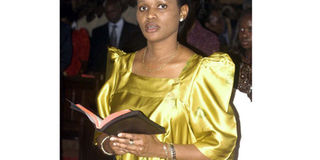Addressing the challenges of heritage education

The Nnabagereka of Buganda Sylvia Nagginda has tried to teach the young about their culture through the annual Ekisakaate. However, there are not many people like her who appreciate culture and can therefore teach it to the younger generation. File Photo.
What you need to know:
With the younger generation increasingly distancing itself from its culture, inculcating it as part of the school curriculum seems the best way of making sure they learn their heritage.
The erosion of traditional cultural norms and customs, demonising African heritage and culture, under-funding of heritage sites, cultural and ethnic intolerance and modern communication technologies are among the challenges hindering heritage education in Uganda.
These are some of the concerns that were highlighted at a national conference to raise the profile of heritage education in Uganda organised by the Cross-Cultural Foundation of Uganda (CCFU) held on November 29, 2012, at the Uganda National Museum in Kampala. The conference provided an opportunity to share experiences in heritage education, as well as to dialogue with the National Curriculum Development Centre (NCDC) at this crucial time of curriculum review for secondary schools.
What is heritage education?
According to NCDC, heritage education is an approach to teaching and learning about history and culture that uses information available from the material culture and the human and artistic achievements, local technologies, social and economic contribution of diverse groups of people.
They are categorised as historic, cultural (visual, performing or liberal) and natural heritage. The principal culture officer, ministry of gender, labour and social development, Pamela Batenga admits that some policy makers do not appreciate the role of culture in development.
The challenges
“We always have to grapple with negative cultural practices (defined as negative by outsiders but as good by the custodians, for example, Female Genital Mutilation),” Batenga notes in a paper, Our National Appreciation of Culture Heritage.
“Funds and staffing to implement the culture function are inadequate at all levels. Art and heritage education is not being taken seriously in educational institutions even when it is on the syllabus,” Batenga said.
“Most of our heritage sites are under-funded, have faced series of arson attacks (like the Kasubi tombs) and some even on the verge of being sold off in the rush for privatisation (like the Uganda Museum),” the programme manager, The Nnabagereka Development Foundation, Andrew Adrian Mukiibi laments.
According to Mukiibi, heritage education has seen the erosion of traditional cultural norms and customs in the process of colonisation through western education, religion and systems of governance introduced by colonialism. “One of the challenges of the new world we live is what they call “Atomised Networking”. For instance, many young people prefer to network from their own bases by linking up through social media like Facebook, Twitter, blogs, among others, rather than physically networking and connecting with one another. While this has advantages, the biggest challenge is how heritage education can effectively adjust to suit the realities of younger people,” Mukiibi said.
In his paper Heritage Education in Uganda with a Focus on the Role of Ekisaakate Kya Nnabageraka, Mukiibi observes that many 21st century parents, guardians and teachers do no appreciate the value and relevance of heritage education and as such, cannot be effective knowledge bearers to pass this on to younger generations. “Increasing levels of cultural, ethnic and social intolerance undermines the principles of cultural diversity and celebration of our heritage,” Mukiibi notes.
Possible solutions
Saidi Twine, an official from NCDC said that content reform at the centre has put emphasis on core content in the curriculum, knowledge that should be known and understood (learned) by all students to equip them with skills for intelligent and fruitful participation in their society.
The content of heritage education fits easily into the established strands of social studies learning such as society and leadership, time and continuity, people and their environment. According NCDC, the best means for including heritage education in the curriculum is infusion-integration with the established curriculum patterns rather than create stand-alone units of study.
Teaching it in schools
Heritage education that has social, economic and political benefits has been included in Uganda’s new curriculum reform under the learning area of Social Studies (SST). It will be taught under the topics of heritage education plus tourism development. “We intend to teach it interactively, with hands on method by instructing teachers to carry out many field visits for practical experience of the learners about heritage education. The experts in heritage studies are called folklorists. Governments employ them to care and provide expert knowledge on heritage resources of the nation, …” Twine said. The new syllabus will recommend for teachers to visit and draw practical experience from approved sites like historical or archeological resources, cultural resources and natural resources, in the hope that students will have a better appreciation of their heritage.




